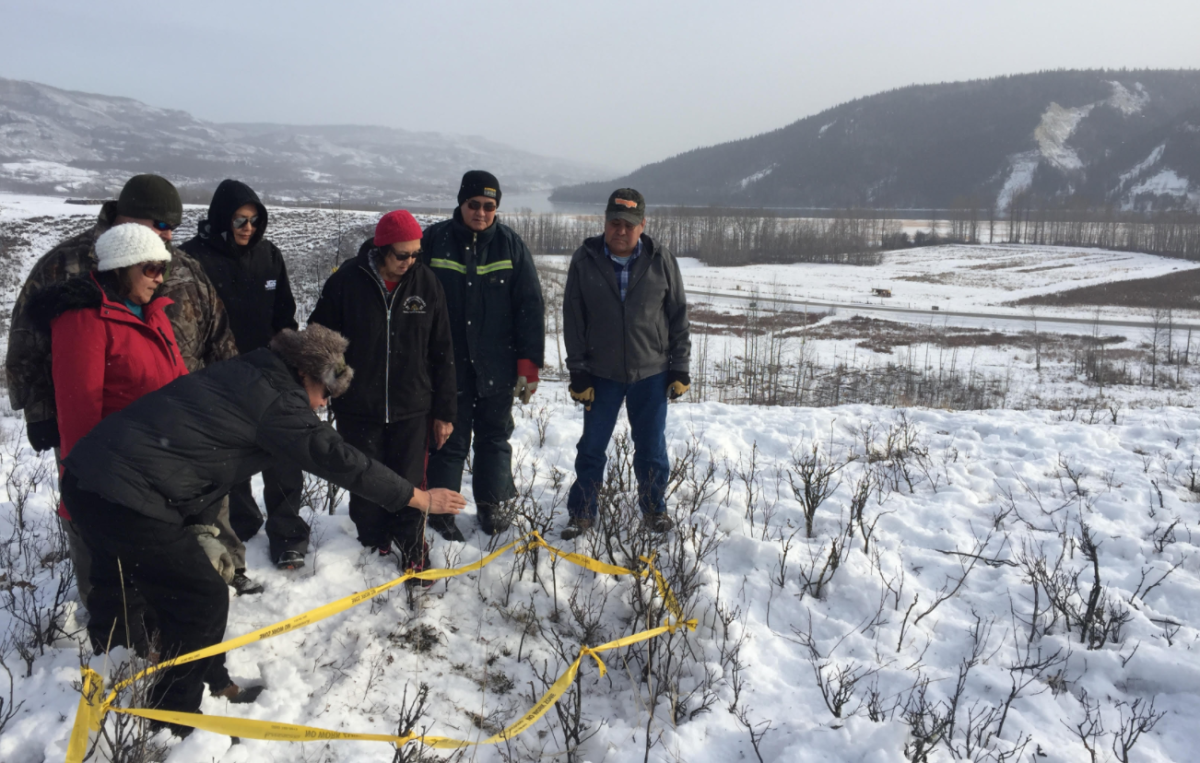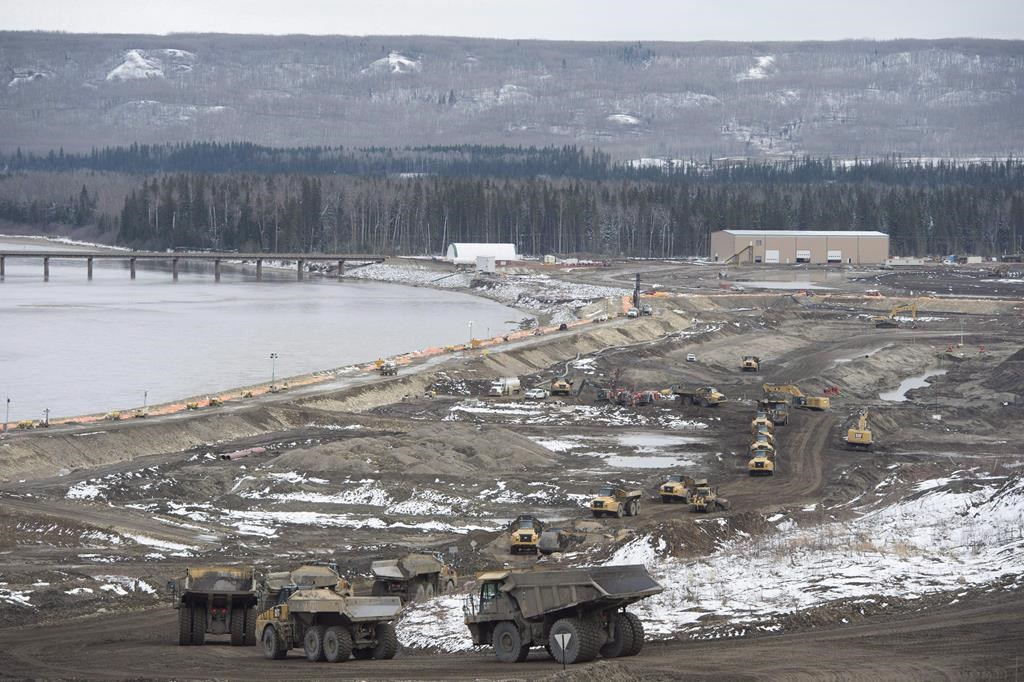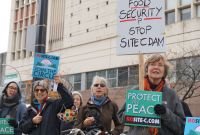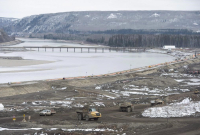Thank you for helping us meet our fundraising goal!
The British Columbia government has given its blessing for BC Hydro to continue construction on the controversial Site C Dam, ending weeks of suspense for both its opponents and supporters.
Upon completion, the hydroelectric mega-project in northeastern B.C. will produce enough power for 450,000 B.C. homes each year, but its reservoir is expected to destroy more than 100 kilometres of river valley bottoms along the Peace River and its tributaries.
"It's been a difficult journey," said Premier John Horgan, announcing his decision in Victoria on Monday. "This is a very, very divisive issue."
The BC NDP leader said he understands "better than most" how "profoundly disappointed" some of his supporters will be as a result of the decision. The dam has sparked outrage from local First Nations and farmers, who say that it has destroyed sacred cultural sites and resulted in the seizure privately-owned agricultural land.
The news was greeted however, by BC Hydro CEO Chris O'Riley, who promised the project would be completed in the "most prudent and efficient way possible."
"We have a responsibility to the province to deliver this project on time and within the revised budget, and we are confident we will be able to do so," he said in a press statement.
Pushed past the point of return
The project was first promoted by the previous BC Liberal government under then-premier Christy Clark, who famously vowed to push it "past the point of no return," despite its intense opposition from environmental advocates, the Treaty 8 Tribal Association, civil society groups and property owners in the region.
Horgan said his party has been highly critical of Site C, but given how much construction has already been completed, the most economic course of action is to finish the project. If abandoned now, he explained, it would leave B.C. taxpayers with an "immediate and unavoidable" $4-billion cancellation bill, resulting in rate hikes or reduced funds for schools, hospitals and other infrastructure.
"I want to stress that this is not a project we favour, this is not a project we would have started...we do it with a heavy heart, but we have to focus on the future," he said.
The project has been in discussion for more than 30 years and rejected twice by previous governments during the eighties and nineties. To date, $2 billion has already been invested in it.
The BC NDP promised in its election campaign that it would review the Site C dam before deciding whether to move forward with Site C. Although Horgan asked BC Hydro to pause construction on certain aspects of the dam in June, the Crown corporation denied the request, saying that any delay of evictions along the Peace River would cause major setbacks and add $630 million to project's construction tab.
First Nations ready to go to court
In November, the BC Utilities Commission (BCUC) — assigned to weigh the costs and benefits of the dam by Horgan's government — concluded that the Site C dam was not needed to meet the province's energy needs. It warned that the cost of the dam would likely increase from $8.8 billion to a minimum of $10 billion, and that it won't be completed by its 2024 target.
Alternative energies would be much cheaper by then, it added, and if the project were to be cancelled, it would cost taxpayers about $1.8 billion in addition to the cost of finding alternative power sources.
West Moberly First Nations Chief Roland Willson said the government's approval of Site C would inevitably harm its relationship with First Nations who opposed it.
"It definitely sets the tone," he told National Observer. "They had the ability to stop the project. They just didn't have the willingness to do it."
The West Moberly First Nations and Prophet River First Nation announced they intend to obtain a court injunction to halt construction of the project and commence a civil action for Treaty infringement. Chief Willson said he hasn't met with Horgan since the NDP leader assumed government leadership, and that he feels First Nations were "pushed to the side" in discussions about the dam.

Greens accuse Horgan of mirroring Clark
Reacting to Monday's news, BC Green Party leader Andrew Weaver said his caucus was "extremely disheartened," and it it "fiscally reckless" to finish the project.
“This government promised to be better than the BC Liberals," he said in a news release. "On this issue, the NDP government’s approach has turned out to be no different whatsoever."
Earlier this month, Weaver urged Horgan to cancel the dam in an open letter. He called the Site C project "irresponsible" and warned it would lock B.C. into higher hydro rates, as the cost of renewables like wind, solar and geothermal energy drop significantly.
"Site C locks us into an energy future that could impose significant burdens on future ratepayers, and we would be forced to sell any surplus power at a loss," Weaver wrote in the letter. "All around the world jurisdictions are embracing a modern, 21st century approach to energy policy... Site C puts this future further out of reach, doubling down on the energy projects of the last century and undermining our ability to embrace the future."
Former BC Hydro CEO Marc Eliesen, who has long been outspoken about the project, said the B.C. government had every reason to reject the project after the BCUC report. He confessed however, on Monday, that he suspected the BC NDP would approve the dam either way.
"Once the BCUC report came out, it was my view and the view of so many others that...the Horgan government would have to terminate the project," Eliesen told National Observer. He was among the presenters who made the case to BCUC this fall to cancel the project.
Eliesen said his concern about the project intensified after hearing B.C. Energy Minister Michelle Mungall's recent responses to questions about the dam. Speaking about the costs of the project in the legislature last month, the minister said the decision would not be an easy one, and that "no matter what happens at the end of the day, British Columbians are going to have to pay" for the project.
The Independent Contractors and Businesses Association (ICBA), meanwhile, applauded the B.C. government's decision to complete the project.
"Better late than never for John Horgan and the NDP Government to support Site C,” Chris Gardner, ICBA president stated. “This entire process and all of the uncertainty it caused was completely unnecessary."
Karen Tam Wu, a spokesperson for the Pembina Institute, said now that the decision has been made, B.C. needs to focus on moving its climate goals forward and reducing its reliance on fossil fuels.
“The magnitude of action that’s necessary to achieve B.C.’s climate goals — which are, in turn, integral to Canada fulfilling its international commitments under the Paris Agreement — cannot be overstated," she said. "We need a robust made-in-B.C. strategy that goes far above and beyond business as usual."






Comments
The NDP can accuse the Liberals all they want of having made the decision to start this project, but they made the decision to carry on with it, and they will wear it. If they think we will have forgotten or forgiven by 2021, they're mistaken. The choice before us is to retire from politics in a cynical fit of anger, or to remember the politicians who really would die on the hills that matter -- Jean Swanson and Kshama Sawant spring to mind -- and make the NDP feel pain over this decision. Make them feel it today and make them feel it every day right up to 2021, when we need to make them feel it at the ballot box. That's the alternative to creeping away like a wounded animal. Stay steady, folks!
Agree 100%. Time for the Greens to take the helm....
Its the wrong decision, but it was likely made for all the old reasons. Money invested; contracts signed; deforestation and earth removal well underway. Our old business as usual way of interacting with the earth...which so many find natural, since its how they've always made their 'living'........pushing earth around, so that it suits some capital intensive vision of how that earth should be.
Its a decision made without factoring in Global Warming. It forgets about methane, although forever big mega dam projects have produced it. It forgets about where water comes from, and how it needs to flow. And it forgets about land. In the west we still assume our food will come from somewhere...else..and so its fine to trash arable land. We do it regularly, around the perimeter of all our cities.
Growth. We love it, believe in it, absolutely have to have it. And when the land we sacrifice is wooded..that's good for a logging industry that hasn't been really profitable for decades. Our governments will subsidize that...out of our taxes. When its reserve land, so much the better. Our racist assumptions tend to believe that land isn't being well 'used' either....frack that space, or better yet, inundate it. Farm land? What farm land we still have wouldn't grow anything without migrant workers. That's how much we value the allevial soil along the Peace...sacrifice it.
For a boondoggle project designed to provide free power for liquified natural gas. A business as usual project we deep earth bomb out of temporary wells....so we can sell it quick...to Asia. Knowing full well that China is the end game....if she continues on the western trajectory, too many of us still believe is good for business.
The question we should be asking ourselves is "what is business, as we conceive it, good for?" And how many solar panels could we produce, in Canada, and install, in Canada....for the price of one godawful Site C dam??
Shame on the NDP.........and all the people in B.C. pressuring them in this extinction direction.
So well-stated, Mary!! It seems the only thing politicians understand is money, so
I have withdrawn my monthly support for the B. C. NDP! I'm not sure which issue is causing me more pain at this moment - the green light given to the #¥€!! dam construction, or my extreme disappointment in Horgan and the B. C. NDP!!!
I hear you. But don't just stop your monthly donation to the NDP....transfer it, to Coast Protectors, or Raven Trust.....and tell Horgan and the B.C. NDP where it's going. We all need to step up our game, become more vocal and active (by which I mean, put our money where our mouth is...and when necessary, our bodies also). We all need to support each other in this shift. Climate change is coming like a freight train at an unregulated crossing.....maybe folks at the centre don't feel the urgency....but those of us on the ground should.
And we both know I'm sure: if more of us real people stepped up and demanded a change in direction...we'd have a good chance of getting one. Too many of us bitch...but don't put any muscle into the transition all life on earth needs now.
Peace.
The NDP should have accepted their losses, licked their wounds, and WALKED AWAY!!!
It is unfortunate--we lost some great opportunities, or at least postponed them: development of alternative energies, development of agriculture in the NE and food supply, maintenance of Carbon Capture and Storage (CCS) in the vegetation and well-managed farmlands (now to be flooded, opportunity for respecting indigenous rights, opportunity to develop alternative energies. All these are now on hold. And what happens on Kinder Morgan, will Horgan still apply every tool in the toolbox, or decide to cave in to the corporations and big money. Yes, I will withhold further contributions to the NDP, and support Greens, Coast Protectors, and other advocates of climate action.
Continuing old world technology in this age of rapid climate change is a recipe for disaster. River's get dammed and water diverted; fish lose, the ecosphere loses, and far cheaper and more distributed forms of electrical energy get delayed. If we were paying better attention, to the fires and floods increasing in numbers and severity around the world...we would not treat our real wealth....our free flowing rivers, our boreal carbon capturing forests, and our plentiful clean water as resources that exist only for the benefit of short term jobs directed by those who think nature needs improvement....and their bulldozers know just how to do it.
It is not an ecologically sound project; it should be scrapped, and the billions that are going to be wasted put into solar and wind. That is the future. If we have one.